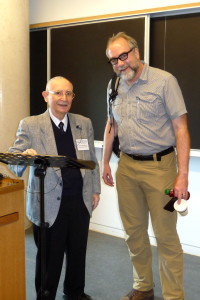The week of the 11th tot he 16th of July was Digital Humanities 2016 in Kraków. This conference was, in my opinion, the best organized DH conference I have attended (and I have attended most of them since the first joint ACH-ALLC conference in Toronto in 1989.) Jan Rybicki and Maciej Eder deserve credit for a lovely conference.
My conference notes are on philosophi.ca so I won’t go into a lot of detail here. Some of the themes worth noting include:
- Diversity. There was a lot of discussion and sessions dedicated to diversity of different sorts. Real differences were aired that I think most people felt was good.
- Pedagogy. Perhaps it is what I attended, but it seemed that there was a new energy around pedagogical discussions. I was impressed by the creative approaches and also by the large-scale projects like Dariah-EU working group on Training and Education.
- Web Historiography. There were a number of talks/panels that drew on the web as evidence. I was pleased to see a discussion of the need to think historiographically about the web. What is archived? What is missing?
- Posters. There was a great set of posters. Here is a link to photos I took of a selection.
Some of the events and papers I was involved in include:
- New Scholars Symposium which was supported by CHCI and centerNet. I co-organized this with Rachel Hendry.
- Innovations in Digital Humanities Pedagogy: Local, National, and International Training. I was part of a one day mini-conference on training and gave a short presentation on Visualization at the final panel on Publication Approaches Supporting DH Pedagogy.
- CWRC & Voyant Tools: Text Repository Meets Text Analysis. I was one of three instructors on a workshop on CWRC and Voyant.
- Curating Just-In-Time Datasets from the Web. I gave a paper on a project that is scraping Twitter that was coauthored with Todd Suomela and Ryan Chartier.
- The Trace of Theory: Extracting Subsets from Large Collections. I introduced and gave one of the short papers on a panel of work we did as part of the Text Mining the Novel project with the HathiTrust Research Center.
- Web Historiography – A New Challenge for Digital Humanities? I gave a short presentation on the Ethics of Scraping Twitter.

